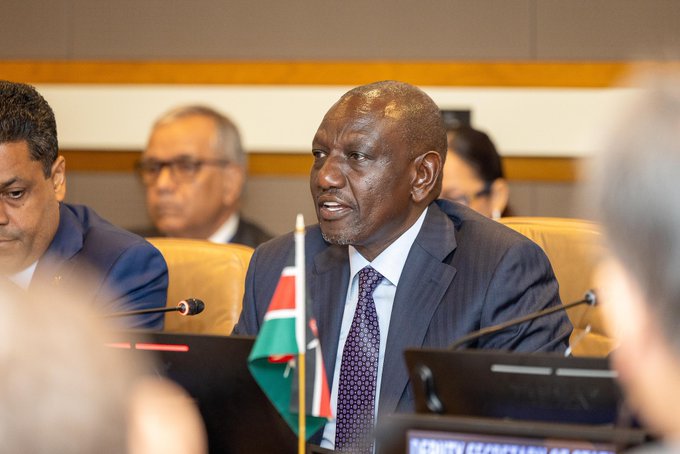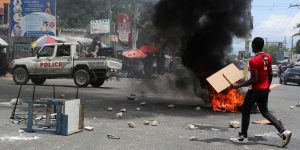News
Ruto Calls Out International Community for Abandoning Kenya-Led Haiti Mission, Criticizes U.S. for Donating Used Vehicles

New York, USA – President William Ruto has accused the international community of neglecting the Kenya-led Multinational Security Support (MSS) mission in Haiti, warning that the lack of resources and logistical backing has undermined efforts to stabilize the violence-ridden Caribbean nation.
Speaking at a high-level side event on Haiti during the 79th United Nations General Assembly in New York, Ruto lamented that Kenya had been left to shoulder the burden almost singlehandedly, with little meaningful support from global partners.
“For many years, the people of Haiti have repeatedly called on the international community to stand in solidarity with them. Too often, their appeals have been met with indifference or with support that was hesitant and inadequate,” Ruto said.
The president revealed that Kenya’s deployment, initially intended to be backed by 2,500 personnel and extensive logistical support, has been crippled by poor resourcing. Currently, the MSS only fields 989 officers—less than 40 percent of the intended number—with Kenya contributing 737. Other participating states include Guatemala, El Salvador, Jamaica, the Bahamas and Canada.
Ruto expressed frustration that even the support Kenya received from the United States came in the form of second-hand vehicles, which frequently broke down in hostile areas, endangering Kenyan personnel.
“I must commend the United States for giving us vehicles. Unfortunately, most of them were second-hand, and they broke down and put our people in grave danger. We did not get any useful support from any other quarters,” he said.
The MSS was launched in October 2023 to help Haitian authorities push back powerful gangs that have paralyzed the country. However, the mission has struggled to establish 12 planned forward operating bases due to logistical blockages, including the inability to move food and equipment beyond the capital, Port-au-Prince.
Kenya’s mission has already paid a heavy price, with President Ruto confirming the deaths of three officers: Benedict Kuria Kabiru, Samuel Tomoi Kaetuai and Kennedy Nzuve. Kabiru was declared missing in action after a gang ambush, though Haitian officials have said he was killed and his body seized by militants.
Ruto insisted that Haiti’s people deserve better, calling it “unacceptable and indefensible” that the world has failed to rally around the effort.
“The people of Haiti may be of African descent, but, for heaven’s sake, they are members of the human race, and they deserve as much, not less,” he said.
The mission’s mandate expires on October 2, with the UN Security Council set to decide whether to extend, remodel, or replace it. The U.S. and Panama have already tabled a proposal for a new 5,500-strong Gang Suppression Force (GSF), which would focus exclusively on dismantling armed groups, now united under the Viv Ansanm coalition led by notorious gang boss Jimmy Cherizier, alias Barbecue.

A man holds placards near a burning barricade during a protest against gang-related violence and to demand the resignation of Haiti’s transitional presidential council, in Port-au-Prince, Haiti, May 15, 2025.
Photo credit: Jean Feguens Regala
U.S. Deputy Secretary of State Christopher Landau urged the global community to back the new resolution, saying it had Haiti’s full endorsement and responded directly to Kenya’s call for more robust support.
Ruto, however, made it clear that Kenya’s frustrations over the past year should serve as a lesson for the next mission.
“If we are sending a security team, the mandate must be clear. We must also have a predictable resource package, not what Kenya has gone through—a game of guesswork. Haiti’s problem can be solved, but only if the world is serious,” he said.
Do you want me to frame this piece more as a hard news report (straightforward, fact-driven) or a deep-dive feature that highlights the behind-the-scenes politics and Kenya’s frustrations with global power dynamics?
Kenya Insights allows guest blogging, if you want to be published on Kenya’s most authoritative and accurate blog, have an expose, news TIPS, story angles, human interest stories, drop us an email on [email protected] or via Telegram
-

 Grapevine1 week ago
Grapevine1 week agoAlleged Male Lover Claims His Life Is in Danger, Leaks Screenshots and Private Videos Linking SportPesa CEO Ronald Karauri
-

 Lifestyle2 weeks ago
Lifestyle2 weeks agoThe General’s Fall: From Barracks To Bankruptcy As Illness Ravages Karangi’s Memory And Empire
-

 Grapevine6 days ago
Grapevine6 days agoRussian Man’s Secret Sex Recordings Ignite Fury as Questions Mount Over Consent and Easy Pick-Ups in Nairobi
-

 Investigations3 days ago
Investigations3 days agoMulti-Million Dollar Fraud: Three Kenyans Face US Extradition in Massive Cybercrime Conspiracy
-

 Investigations2 weeks ago
Investigations2 weeks agoEpstein’s Girlfriend Ghislaine Maxwell Frequently Visited Kenya As Files Reveal Local Secret Links With The Underage Sex Trafficking Ring
-

 News2 weeks ago
News2 weeks agoState Agency Exposes Five Top Names Linked To Poor Building Approvals In Nairobi, Recommends Dismissal After City Hall Probe
-

 Economy2 days ago
Economy2 days agoIran Demands Arrest, Prosecution Of Kenya’s Cup of Joe Director Director Over Sh2.6 Billion Tea Fraud
-

 Business1 week ago
Business1 week agoM-Gas Pursues Carbon Credit Billions as Koko Networks Wreckage Exposes Market’s Dark Underbelly
















